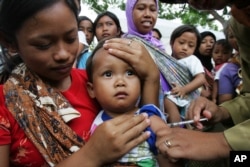As Indonesia’s health ministry undertakes a huge campaign to immunize 70 million children against rubella and measles, critics say those efforts have been complicated by an edict issued by the country's top Muslim clerical body, Indonesian Ulema Council, declaring some of the vaccine's ingredients as forbidden by Islam.
While the quasi-governmental body’s edict, a fatwa, did not explicitly prohibit Indonesian Muslims from using the vaccine, experts are warning it is having consequences for immunization efforts in poorer, more religiously conservative parts of the nation and its more than 18,000 islands, threatening to derail the $100 million campaign supported by the World Health Organization (WHO).
The measles-rubella (MR) vaccine that Jakarta is rolling out is produced by the Serum Institute in India, the only manufacturer capable of producing a quality vaccine in the quantity required by Indonesia, and contains materials derived from pigs, which are considered forbidden for consumption by Muslims.
Measles is a highly contagious respiratory disease which causes a rash and fever and can be deadly for babies and young children, while rubella exhibits similar symptoms and can cause death or serious birth defects for the fetus if contracted by a pregnant mother. Congenital deafness is most commonly caused by rubella during pregnancy.
The Saudi-based Islamic Advisory Group for Polio Eradication, a grouping of religious scholars, Islamic institutions, and researchers whose aim is to stamp out the disease among Muslim communities worldwide, has recommended the use of vaccines containing generally banned ingredients if there is no other form available.
“Parents (have) the sharia obligation of vaccinating their children,” Abbas Shouman, undersecretary of Egypt's Al-Azhar, considered one of the world’s preeminent authorities on the interpretation of Islamic law, said in 2015. His institution has spearheaded the advisory group's eradication efforts.
UNICEF officials say the MR vaccination is currently administered in 143 countries, including nearly 30 that are majority Muslim.
In Indonesia, however, the powerful Indonesian Ulema Council, known as MUI, seeks to halal-certify all products imported and made in Indonesia, including vaccines. Its latest fatwa said that while the vaccine contained elements that would be otherwise generally prohibited by Islam, the immunization was ultimately permissible for Indonesian Muslims.
But the MUI's weighing in has spurred renewed public debate on whether Muslims should immunize their children and sparked new calls for the Indonesian state-owned pharmaceutical manufacturer Bio Farma to develop a halal-compliant version of the vaccine. The company, in a statement, said that could take 15 to 20 years.
“Last year we already requested a statement on the Sharia aspects of the vaccination campaign from the ministry of health, said the MUI's Deputy Secretary General, Salahuddin Al-Ayyubi. "To date we have yet to receive a positive response,” he said.
Others argue the benefits justify a more pragmatic approach.
"If [vaccines] contain parts from pigs, it is not a problem. Why? Because the fact is, until today, we haven’t discovered an alternative,” Mahbub Maafi, an imam and vice secretary of the body responsible for issuing fatwas from Indonesia’s largest Muslim organization, Nahlatul Ulama, told VOA. “If we’re talking about vaccines, doctors are the most authoritative, not kyai (Javanese for Islamic scholar), not ulama, in this context,” he said.
In parts of the country where Islam is practiced in a more fundamentalist form, however, the MUI’s fatwa is likely to have the greatest impact – namely in densely populated parts of Sumatra, including the provinces of Riau and West Sumatra.
“The number of students who want to get MR immunization has dropped dramatically day by day. We guess the target won’t be achieved even if the campaign continues,” said the acting head of the Pekanbaru Health Agency in Riau, Zaini Rizaldy Saragih, as quoted by the Jakarta Post last week, adding that only 20% of local children had been vaccinated.
Indonesia’s health ministry has pledged to have 95% all children 9 months to 15 years old immunized, an achievement that would effectively eliminate measles and rubella in the country by 2020. “The purpose of the campaign is to control the spread of both diseases,” the Indonesian Minister of Health Nila Moeloek said when launching the first phase of the campaign in Java last August.
Due to a lack of accessible, quality primary healthcare, millions of Indonesian children remain highly vulnerable, as reflected by a deadly outbreak of measles which killed more than 100 people in the impoverished eastern province of Papua earlier this year. An estimated 150,000 Indonesian children contract measles each year. As many as 10% of them die as a result.
Grace Melia, founder of the rubella support group Rumah Rubella, has worked with the Indonesian government to promote public awareness of the disease’s devastating effects, using her child’s story as a case study when she appears at public forums. After Celia contracted rubella during the first trimester of her pregnancy, her daughter was born with profound hearing loss, brain damage and other birth defects.
“This is the real impact and damage of rubella. It really cannot be underestimated," she told VOA. "The MUI already encouraged us to get our children vaccinated, so why not?”







